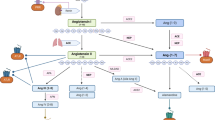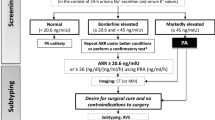Summary
After long-term captopril treatment, an inappropriate increase in aldosterone levels has been observed in hypertensive patients. It is not known, whether a similar change would occur in patients with severe congestive heart failure, and whether it is due to a decrease in endogenous dopaminergic inhibition of aldosterone secretion or to aldosterone stimulation by ACTH or an ACTH-related peptide. Therefore, the aldosterone and prolactin responses to metoclopramide have been studied in 10 patients with severe congestive heart failure (NYHA Class III or IV) after 6 months of captopril treatment, before and 11 h after pretreatment with dexamethasone. 7 placebo-treated patients served as double-blind controls. In captopril-treated patients, the supine aldosterone levels exceeded the normal range and were as high as in placebo-treated patients. The responsiveness of aldosterone and prolactin to metoclopramide was not influenced by captopril. Only in the placebo group were the aldosterone levels decreased by dexamethasone. Captopril increased plasma renin activity and serum potassium, and decreased supine epinephrine and norepinephrine and serum sodium. Thus, previous reports of inappropriately high aldosterone levels after long-term captopril treatment were confirmed in patients with severe congestive heart failure. It is concluded that increased aldosterone is due neither to a decrease in endogenous dopaminergic inhibition nor to dexamethasone-suppressible stimulation of aldosterone secretion.
Similar content being viewed by others
References
Atkinson AB, Robertson JIS (1979) Captopril in the treatment of clinical hypertension and cardiac failure. Lancet 2: 836–839
Brunner HR, Gavras H, Waeber B, Turini GA, Wauters JP (1980) Captopril: an oral angiotensin converting enzyme inhibitor active in man. Arch Int Pharmacodyn Ther [Suppl]: 188–211
Cody RJ, Laragh JH (1982) Use of captopril to estimate reninangiotensin-aldosterone activity in the pathophysiology of chronic heart failure. Am Heart J 104: 1184–1189
Lijnen P, Staessen J, Fagard R, Amery A (1982) Increase in plasma aldosterone during prolonged captopril treatment. Am J Cardiol 49: 1561–1563
Massie BM, Kramer BL, Topic N (1983) Converting-enzyme inhibitor therapy for chronic heart failure. Herz 8: 71–80
Maslowski AH, Nicholls MG, Ikram H, Espiner EA, Turner JG (1981) Haemodynamic, hormonal, and electrolyte responses to withdrawal of long-term captopril treatment for heart failure. Lancet 2: 959–961
Romankiewicz JA, Brogden RN, Heel RC, Speight TM, Avery GS (1983) Captopril: an update review of its pharmacological properties and therapeutic efficacy in congestive heart failure. Drugs 25: 6–40
Studer A, Lüscher T, Siegenthaler W, Vetter W (1981) Captopril in various forms of severe therapy-resistant hypertension. Klin Wochenschr 59: 59–67
Vidt DG, Bravo EL, Fouad FM (1982) Captopril. N Engl J Med 306: 214–219
Nishioka A, Kubo S, Hirota Y, Kawamura K, Takatsu T (1982) A clinical study on the role of the renin-angiotensin-aldosterone system and catecholamine in chronic coongestive heart failure. Jpn Heart J 23: 527–544
Staessen J, Lijnen P, Fagerd R, Verschueren LJ, Amery A (1982) Rise in plasma concentration of aldosterone during long-term angiotensin II suppression. J Endocrinol 91: 457–465
Edwards CRW, Al-Dujaili AES, Williams BC (1983) Novel control mechanisms of aldosterone secretion. In: Kaufmann W, Wambach G, Helber A, Meurer KA (eds) Mineralocorticoids and hypertension. Springer, Berlin Heidelberg New York Tokyo
Stumpe KO, Kolloch R, Higuchi M, Krück F, Vetter H (1977) Hyperprolactinemia and antihypertensive effect of bromocriptine in essential hypertension. Lancet 2: 211–214
Jungmann E, Grützmacher P, Althoff P-H, Faßbinder W, Schoeppe W, Schöffling K (1984) Die Wirkung von Metoclopramid auf die Aldosteron- und Prolactinsekretion. Nieren Hochdruckkrankh 13: 58–64
Störger H, Hadler D, Reifart N, Kaltenbach M, Bussmann WD (1984) Langzeittherapie mit Captopril bei schwerer chronischer Herzinsuffizienz. Randomisierte Doppelblindstudie. Z Kardiol 73 [Suppl 1]: 17
Da Prada M, Zürcher G (1976) Simultaneous radioenzymatic determination of plasma and tissue adrenaline, noradrenaline and dopamine within the femtomole range. Life Sci 19: 1161–1174
Jungmann E, Schumm PM, Althoff PH, Schöffling K (1983) Die differentialdiagnostische Abgrenzung der organischen von der funktionellen Hyperprolactinämie mit Hilfe eines Metoclopramid-Kurztests. Akt Endokr Stoffw 4: 141–144
Norbiato G, Bevilacqua M, Raggi U, Micossi P, Moroni C (1977) Metoclopramide increases plasma aldosterone in man. J Clin Endocrinol Metab 45: 1313–1316
Jungmann E, Wächtler M, Schwedes U, Usadel KH, Schöffling K (1983) The effect of metoclopramide and haloperidol on plasma renin activity and aldosterone levels in rats. Res Exp Med 183: 133–138
Jungmann E, Althoff PH, Hermann GJ, Schöffling K (1984) The effect of pizotifen, a serotonin antagonist, and of pirenzepine, a muscarinic antagonist, on hormonal responses to metoclopramide in healthy man. Arzneimittelforsch 34: 1022–1024
Sowers JR, Brickman AS, Sowers DK, Berg G (1981) Dopaminergic modulation of aldosterone secretion in man is unaffected by glucocorticoids and angiotensin blockade. J Clin Endocrinol Metab 52: 1078–1084
Neill JD (1980) Neuroendocrine regulation of prolactin secretion. In: Martini L, Ganong WF (eds) Frontiers in neuroendocrinology 6. Raven Press, New York
Oelkers W, Schöneshöfer M (1983) Acute and chronic regulation of aldosterone secretion in man. In: Kaufmann W, Wambach G, Helber A, Meurer KA (eds) Mineralcorticoids and hypertension. Springer Verlag, Berlin Heidelberg New York Tokyo
Relkin R, Adachi M (1973) Effects of sodium deprivation on pituitary and plasma prolactin, growth hormone and thyrotropin levels in the rat. Neuroendocrinology 11: 240–247
Author information
Authors and Affiliations
Rights and permissions
About this article
Cite this article
Jungmann, E., Störger, H., Althoff, P.H. et al. Aldosterone and prolactin responsiveness after prolonged treatment of congestive heart failure with captopril. Eur J Clin Pharmacol 28, 1–4 (1985). https://doi.org/10.1007/BF00635699
Received:
Accepted:
Issue Date:
DOI: https://doi.org/10.1007/BF00635699




